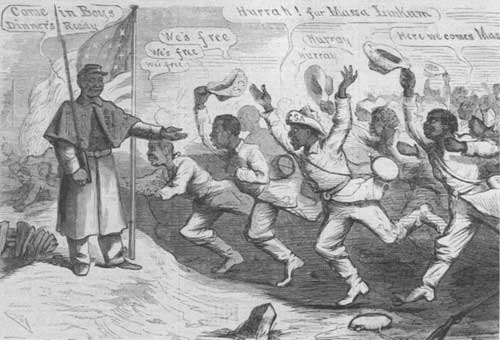|
CONFEDERATE EFFORTS AT BLACK ENLISTMENT
Throughout the first three years of the war, several Southerners had
suggested that the Confederacy enlist black men. The Confederate
government viewed such proposals as extremist and flatly rejected
them.
Late in the war, as Confederate ranks
dwindled, voices calling for the enlistment of African Americans grew
louder and louder.
|
Late in the war, as Confederate ranks dwindled, voices calling for
the enlistment of African Americans grew louder and louder. Despite
slavery's centrality to secession, these whites realized that the
Confederacy must use its resources optimally, and one of those resources
was slavery. By early 1864, Major General Patrick Cleburne, an
outstanding division commander, circulated a proposal among some general
officers in the Army of Tennessee endorsing black enlistment. They
argued that slavery was no longer a strength but "in a military point of
view, one of our chief sources of weakness." European nations hesitated
to aid the Confederacy in its struggle for independence because of the
institution of slavery. Early in the war, slaves had produced foodstuffs
for the Confederate armies; now bondsmen ran off to labor for the Union
or serve in its armed forces. Meanwhile, Confederate armies barely held
their own against overwhelming Federal forces, primarily because these
able-bodied black males were forbidden from serving in the ranks.
At the time the proposal generated little support. The army commander
forwarded the document to Jefferson Davis, and he quashed it. Burt one
year later, with the war effort on verge of collapse, Confederate
politicians resurrected the issue of black military service. The
argument was heated. "Use all the negroes your can get, for all the
purposes for which your need them, but don't arm them," urged Georgian
Howell Cobb to the secretary of war late in the war. "The day you make
soldiers of them is the beginning of the end of the revolution. If
slaves will make good soldiers our whole theory of slavery is wrong."
Others pleaded for legislation that would draw black men into the fight
on the Confederate side as a practical matter. The armies desperately
needed troops, and they could fill that void. These politicians valued
an independent Confederacy more than slavery; anyway, unless the
Confederate army filled its ranks, the Union forces would crush the
secession movement and with it the institution of slavery. Back and
forth the debate raged. The decisive opinion, though, was Robert E.
Lee's. The general endorsed black enlistment. Without the infusion of
manpower the Confederate armies could not last much longer. The Union
had employed black troops with some success, Lee noted, and he believed
they would make "efficient soldiers" for the Confederacy.

|
AN ILLUSTRATION MOCKING THE IDEA OF THE CONFEDERACY ATTEMPTING TO FORM
BLACK REGIMENTS. (FW)
|
When the war ended, the Confederacy was organizing its first black
units in Richmond. They never saw combat. Yet the importance of the
decision indicates how strongly the war and the performance of black
soldiers in the Union army had affected Confederate attitudes.
|
|
